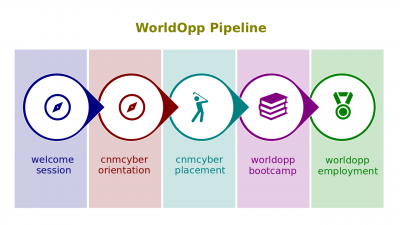Difference between revisions of "What Occupation Is"
MariamKhalid (talk | contribs) (→Placement entrance exam) |
MariamKhalid (talk | contribs) (→Placement entrance exam) |
||
| Line 35: | Line 35: | ||
:#Everyone needs (or does not need) to define his or her own occupation. | :#Everyone needs (or does not need) to define his or her own occupation. | ||
:#Occupation is (not) the endeavor undertaken in order to achieve one or more of the following: (a) to discover one's vocation, (b) to identify one's occupation, (c) to locate one's target employment, (d) to identify missing credentials, (e) to develop the missing credentials, and (f) to land one's job. | :#Occupation is (not) the endeavor undertaken in order to achieve one or more of the following: (a) to discover one's vocation, (b) to identify one's occupation, (c) to locate one's target employment, (d) to identify missing credentials, (e) to develop the missing credentials, and (f) to land one's job. | ||
| − | |||
:#Occupation is (not) a job, profession, and/or position that somebody works in. | :#Occupation is (not) a job, profession, and/or position that somebody works in. | ||
Revision as of 13:40, 7 September 2020
What Occupation Is (hereinafter, the Lectio) is the second lesson part of the Nature of Occupations lesson that introduces its participants to occupations and related topics.
This lesson belongs to the Introduction to Employment session of the CNM Cyber Orientation. The Orientation is the second stage of the WorldOpp Pipeline.
Content
The predecessor lectio is Professional Specialties.
Key terms
- Occupation. The regular activity that a person undertakes to earn his or her livelihood. That activity can be a job, profession, or position that somebody works in. Entrepreneurs may acknowledge their occupation as self-employed.
- Occupational Information Network. A free web-based resource that contains data for various occupations that can be helpful for students, job seekers, businesses and workforce development professionals to understand today's world of employment in the United States. It particularly uses Holland Occupational Themes in its "Interests" section.
- Occupational Outlook Handbook. A publication of the United States Department of Labor's Bureau of Labor Statistics that includes information about the nature of work, working conditions, training and education, earnings and job outlook for hundreds of different occupations in the United States.
Script
- An occupation is the regular activity that people undertake to earn their livelihood. That activity can be a job, profession, or position that somebody works in. The occupation is more specific than the professional specialty.
- Target occupations of the WorldOpp Pipeline graduates, for instance, are an account manager, accountant, business administrator, business analyst, business buyer, configuration manager, content manager, contracts administrator, DevOps engineer, functional manager, graphic designer, information architect, partner liaison, procurement manager, product designer, product owner, project manager, Scrum Master, solution architect, systems engineer, team lead, usability analyst, and UX designer.
- In the United States, its Department of Labor is the leading body in identifying and classifying various occupations. Its Bureau of Labor Statistics publishes the Occupational Outlook Handbook. It includes information about the nature of work, working conditions, training and education, earnings and job outlook for hundreds of different occupations.
- The Occupational Information Network is another free web-based resource that contains data for various occupations that can be helpful for students, job seekers, businesses and workforce development professionals to understand today's world of employment in the United States.
Personalities and Work is the successor lectio.
Questions
Lectio quiz
- The answer is recorded for the lectio completion purpose:
- Is the difference between one's professional specialty and occupation explained well? --Yes/No/I'm not sure/Let me think/Let's move on
Placement entrance exam
Every statement below is split into one true and one false question in the actual exam.
- "Occupation" questions:
- Everyone needs (or does not need) to define his or her own occupation.
- Occupation is (not) the endeavor undertaken in order to achieve one or more of the following: (a) to discover one's vocation, (b) to identify one's occupation, (c) to locate one's target employment, (d) to identify missing credentials, (e) to develop the missing credentials, and (f) to land one's job.
- Occupation is (not) a job, profession, and/or position that somebody works in.
